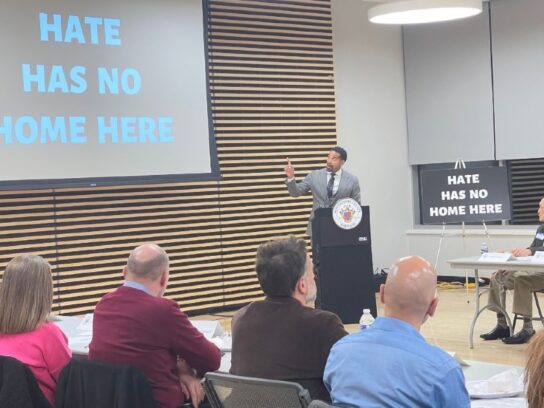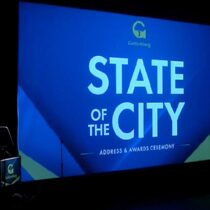
Members of the six communities that make up the Montgomery County Anti-Hate Task Force presented their final reports with the goal of creating a more welcoming community with fewer bias incidents.
Members of the African American/Black, Asian American and Pacific Islander, Jewish, Latino/Hispanic, LGBTQ+ and Muslim cohorts pushed for more educational programs. especially for those employed by Montgomery County Public Schools (MCPS), so they could better understand the history and culture of the various groups.
They also wanted training in how to recognize and report a hate crime or bias incident.
After meeting regularly since July, their numerous recommendations were collected Tuesday. They will be presented to the county council Dec. 5.
“Everyone is really vulnerable, because everyone is experiencing hate,” said Council President Evan Glass, who created the Anti-Hate Task Force.
“The status quo is unexpectable. It is hurtful. It is harmful. It is detrimental,” he said at Tuesday’s meeting at the Wheaton Community Recreation Center. He praised task force members for having “courageous conversations.”
County Executive Marc Elrich addressed the group, noting the county has come a long way but still has far to go. In 1970, the county’s residents were 70% White and 4.5% Black. Now, they are 44% White, 19% Black and 22% Hispanic, he said.
One-third of residents are foreign born, added Councilmember Will Jawando.
Ron White, from the African American/Black cohort, said, “We are in a state of emergency, feeling the wrath of hate.” He noted that Black churches have been vandalized and that Black MCPS students have the highest rates of suspension and rank lowest on the achievement gap.
Aryani Ong of the Asian Pacific Islander cohort said members of this group are the least likely to report hate incidents.
Meredith Weisel of the Jewish cohort noted that while Jews make up only 2.4% of the American population, they frequently are the target of hate incidents. Victims need to “call it out,” she said, suggesting that the task force members continue to meet, perhaps twice a year.
Alex Vazquez of the Latino/Hispanic cohort stressed the importance of understanding what a hate crime is and how to report it.
Phillip Alexander Downie of the LGBTQ+ cohort recommended the county establish a resource center with a physical space for members of this community, who experience high rates of suicide, homelessness and food insecurity.
Ambereen Khan of the Muslim Cohort cited the need for more cultural competency education and mandatory reporting of hate crimes.
“I have heard countless stories from members of our community. They are scared,” she said. She noted that Muslims have been told they support Hamas if they carry a Palestinian flag or wear particular clothing.
“We are weaponizing hate as a way of silencing criticism of the actions of Israel,” she said.
The Anti-Hate Task Force held their final meeting last night. I had the opportunity to reflect & thank the group for their collaborative efforts to develop recommendations to address hate, bigotry, and harassment.
Tune in for the Dec. 5th briefing: https://t.co/mHneNEMzEk pic.twitter.com/bbBLhSMyfn
— Councilmember Will Jawando (@CMJawando) November 30, 2023

